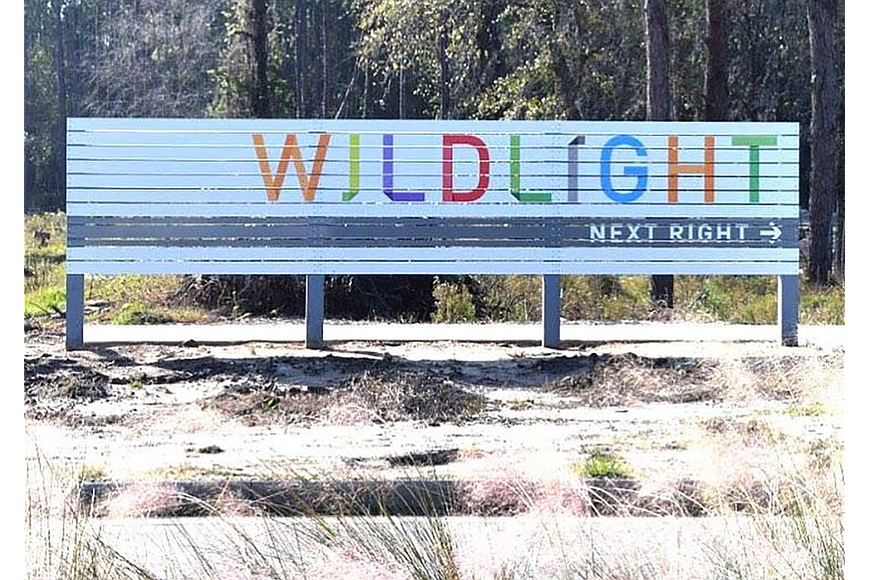
Circuit Judge James Daniel granted a partial summary judgment June 10 in favor of Raydient LLC, developer of the Wildlight community near Yulee, in its lawsuit against the Nassau County Board of Commissioners.
Daniel ruled that creation of the East Nassau Stewardship District as part of the development of Wildlight does not relieve Nassau County of its obligation to provide basic levels of service, such as providing and maintaining parks and recreational facilities, outlined in the county’s Comprehensive Plan.
The summary judgment affects only one count of the six-count lawsuit filed in 2018 by Raydient and nine other entities owned by Rayonier.
Raydient alleged that the Nassau County Board of Commissioners was attempting to make Rayonier pay for park construction and maintenance throughout the county as a condition of developing Wildlight.
That was not part of the original land use agreement the commission approved for Wildlight.
Wildlight’s first phase comprises 1,000 homes and apartments; an elementary school for up to 800 students; a grocery-anchored retail center; a bank; a day care center; an early learning center; a 106-room hotel; 350 acres of preserved open space; and two corporate headquarters.
In 2011, Nassau County approved creation of the East Nassau Community Planning Area on about 24,000 acres of timberland owned by Raydient.
The community planning area is a sector plan governed by state law and is part of the county’s Comprehensive Plan. Up to 24,000 residential units and 11 million square feet of commercial space may be developed within the area.
During the approval process, county ordinances required Raydient to pay recreational impact fees and to donate land to the county for construction of community and regional parks and recreation facilities.
Raydient contends it paid the impact fees and donated 12,000 acres, more than the required amount of land, to the county.
In 2013, the commission approved the first development order for Raydient’s headquarters, some commercial development and a few residential units.
In 2015, Raydient and the commission agreed to create the stewardship district, a limited form of government over an area of development that can create, finance and maintain public infrastructure.
Site preparation began in spring 2016 for Wildlight’s first phase.
Raydient submitted an application in 2016 for approval of the second phase of the project: 1,080 acres, including 1,500 active adult units with on-site recreation mitigation.
During the approval process, disagreement began between Raydient and the county over the planning, building and funding of community and regional parks in the East Nassau Community Planning Area.
The county retroactively sought to have Raydient and/or the stewardship district pay for community and regional parks in the East Nassau Community Planning Area rather than exclusively through developer park and recreation impact fees and countywide taxes.
As a condition for approving the second stewardship district, Nassau County officials specifically demanded that Raydient and/or the district pay $13 million to $15 million for the construction and maintenance of the public parks and facilities.
Raydient refused and insisted that the county’s comprehensive plan and applicable ordinances required it only to donate land.
Even with their inability to reach agreement on who should pay for public parks and recreational facilities in the East Nassau Community Planning Area, Raydient and the commission successfully lobbied the Legislature in 2017 to enact HB 1075 to create the East Nassau Stewardship District.
The bill granted the Stewardship District Board of Supervisors the power to provide public parks and public facilities for indoor and outdoor recreational, cultural and educational uses.
Raydient alleges the county continued to deny approval of Raydient’s application for the second development unless Raydient and the stewardship district agreed to commit $13 million to $15 million to the county for community and regional parks in the community planning area.
According to the lawsuit, the county asserted that HB 1075 transferred to Raydient and the district the county’s obligation to create and maintain parks and recreation facilities in the community planning area.
Raydient maintained the position that its obligation under the county’s Comprehensive Plan and applicable land use provisions was to donate the land for community and regional park facilities. Raydient also said that HB 1075 did nothing to alter the county’s responsibility to fund, build and maintain park facilities through impact fees and countywide taxes.
Daniel agreed.
Completed components of Wildlight comprise Wildlight Elementary School, Rayonier’s corporate headquarters, Florida Public Utilities corporate headquarters, a retail building, UF Health medical center, First Federal Bank, The Lofts at Wildlight Apartments, Heartland Dental Center, KinderCare and single-family homes with community amenities including a swimming pool, playground and 10 miles of trails.
A new residential neighborhood, UF Health Rehabilitation Center, First Coast YMCA, St. Clare Early Learning Center, a Marriott hotel, another retail building and Wildlight Crossing, a grocery-anchored shopping center, are scheduled for completion this year, according to Rayonier spokesman Alejandro Barbero.